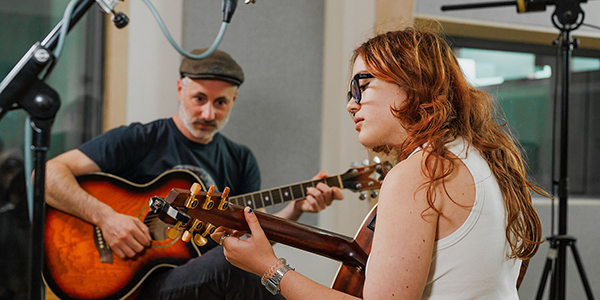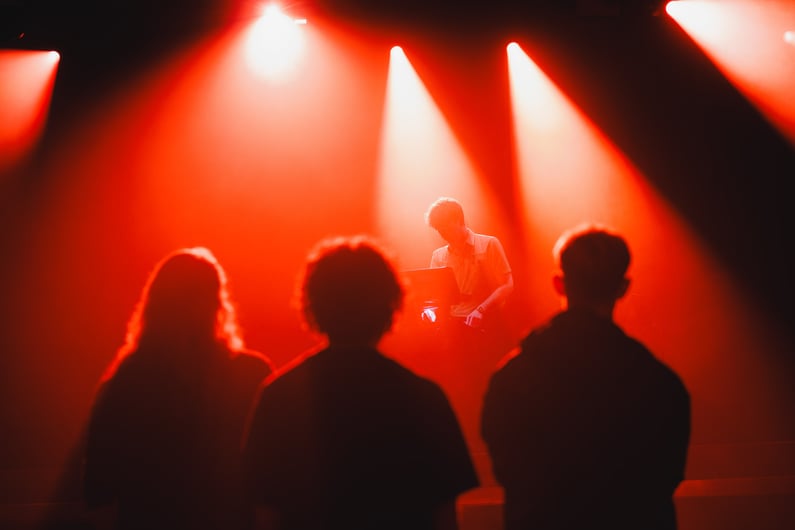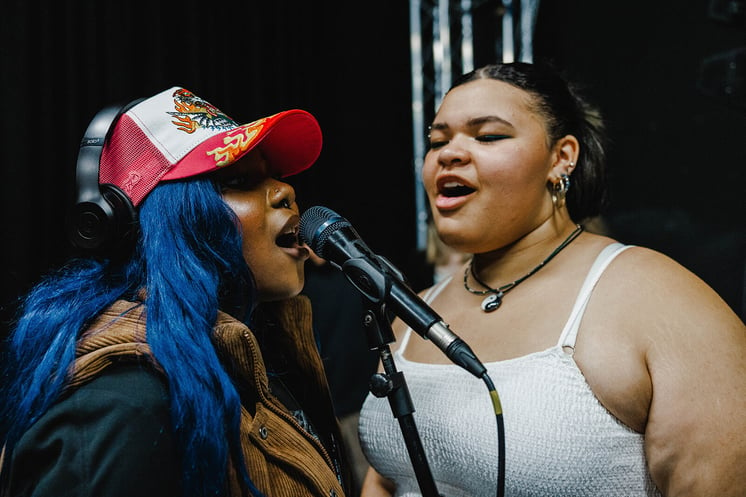Whether you're stepping onto a stage for the first time or preparing for your hundredth performance, nerves are completely normal. Even the most experienced performers get butterflies before a show. But here's the thing: confidence isn't about eliminating nerves, it's about learning to perform with them.
Hannah Phipps, Managing Director of dBs Institute of Music, offers advice for students who might be struggling with their stage performances. "For me, there are three main things that make for a memorable performance: preparation, authenticity and emotional connection," she explains. Let's break down exactly how you can build genuine confidence and deliver performances that stick with your audience.
Practise, practise, practise

You've heard it before, and there's a reason for that: preparation is everything. The more familiar you are with your material, the more mental space you'll have to actually connect with your audience rather than worrying about what comes next.
Start by practising in front of a mirror, it might feel awkward at first, but watching yourself perform helps you notice things you'd otherwise miss. Your body language, facial expressions, and stage presence all contribute to how your performance resonates with an audience. Plus, you are your biggest critic! If you can get comfortable performing for yourself, performing for others becomes that much easier.
"I actually find rehearsing quite boring, but I've learned to respect the process," Hannah admits. "The better prepared you are, the more relaxed, confident and free everyone will be on stage."
But preparation doesn't stop at knowing your part, you need to know the lyrics or music so well that you could perform them in your sleep. This frees up your mind to focus on execution, emotional delivery, and connecting with the crowd, rather than panicking about remembering what comes next.
And here's something many performers forget: test all your tech. Know your plan B. If your backing track fails, what will you do? Can you play that song solo on guitar and make it a moment rather than a mistake? Having backup plans removes a huge source of performance anxiety.
Practise in front of friends and family
Once you're comfortable performing alone, it's time to bring in an audience, even if it's just a small one. Performing for friends and family might seem less intimidating than a real gig, but it's actually one of the most effective ways to build confidence. These are people who know you, which means you can focus purely on your performance without the added pressure of strangers judging you.
Ask for honest feedback. What worked? What didn't? Where did you seem most confident? Getting constructive input from people you trust helps you identify blind spots before you hit a bigger stage.
Plus, having familiar faces in the crowd during an actual performance can be incredibly grounding. When you start to feel overwhelmed, finding your friend's encouraging smile or your family member nodding along can bring you right back to centre.
Remember to breathe
It sounds simple, but when nerves kick in, proper breathing is often the first thing to go. Shallow breathing feeds anxiety and makes it harder to control your voice or your instrument. Before you step on stage, take a few deep breaths. Ground yourself. Feel your feet on the floor.
During the performance, remember that pauses are okay. Breathing between songs or verses isn't a sign of weakness; it's a sign of control. The audience isn't rushing you. Give yourself space to breathe, reset, and stay present.
From our Learn From The Pros session with Mantra, her advice for students who experience performance anxiety was to practice diaphragmatic breathing before they hit the stage: “Before sets, take 30 seconds to breathe deeply: in for four, hold for four, out for four, hold for four. Repeat four times. It’s only 30 seconds, and it genuinely helps ground you in that moment.”
Look over heads

Eye contact with your audience can feel intense, especially when you're just starting out. If looking directly at people makes you freeze up, try this: look just above their heads or focus on the back wall of the venue. To the audience, it looks like you're making eye contact, but it takes the pressure off you.
As you become more comfortable, you can start connecting with individual faces in the crowd. But in the beginning, give yourself permission to keep your focus soft and your gaze general. It's a small trick that makes a big difference.
Remember to have fun
Here's something every performer eventually learns: the audience wants you to succeed. They're not hoping you'll mess up; they're rooting for you. So take a deep breath, and remember that nobody's ever died of embarrassment. Learning how to make mistakes and keep going is one of the hardest things about music, but it's also one of the most important.
Hannah puts it perfectly: "I think the combination of authenticity and emotional connection is what turns a technically good performance into a really memorable one. Stop worrying about how you are being seen and just feel the song - be yourself (or your character) in all your weirdness. If you feel the song, the audience will feel it too."
When you're genuinely enjoying yourself on stage, the audience feels it. Music is meant to be fun, expressive, and shared. Don't get so caught up in being perfect that you forget to actually enjoy the moment you've worked so hard for.
"Perfection is overrated"
![Welcoming Hannah Phipps- Our new Head of Campus at dBs Bristol [Featured Image]](https://insider.dbsinstitute.ac.uk/hs-fs/hubfs/Welcoming%20Hannah%20Phipps-%20Our%20new%20Head%20of%20Campus%20at%20dBs%20Bristol%20%5BFeatured%20Image%5D.jpg?width=1200&height=575&name=Welcoming%20Hannah%20Phipps-%20Our%20new%20Head%20of%20Campus%20at%20dBs%20Bristol%20%5BFeatured%20Image%5D.jpg)
Hannah Phipps, Managing Director of dBs Institute of Music
Hannah Phipps has performed to packed rooms and nearly empty ones, and she's learned something crucial along the way: "Sometimes the audience will be packed and loving it, and it's wonderful to feed off that energy - but you can't rely on the crowd for your confidence, you should also know how to perform the song to an empty room. Some of my biggest fans came from my quietest gigs."
Your job isn't to be flawless. Your job is to be real. "I'm still learning that perfection's overrated," Hannah shares. "The best shows are always a little rough around the edges. The audience can sense when it's real, when what's happening on stage belongs only to that night, that room, that shared moment."
Make every performance a learning experience
Here's the real secret to confidence: experience. The more you perform, the more comfortable you'll become with being uncomfortable. Each gig teaches you something new about yourself, your material, and your relationship with an audience.
"I always think if I have made someone laugh, cry and dance in one show, then that is a job done!" Hannah says. That's the goal: genuine connection through emotional honesty.
So get out there. Attend open mics. Sign up for karaoke nights. Book your first proper gig.
Each performance is a step towards becoming the confident artist you want to be. The nerves might never completely disappear, but you'll learn to perform with them, through them, and sometimes even because of them.
Because at the end of the day, the audience isn't looking for perfection. They're looking for something real, something that moves them, something that could only happen in that exact moment.
Building confidence through education

At dBs Institute of Music, we encourage our students to perform regularly throughout their studies. Whether you’re on our Vocal Artistry, Songwriting, or Music Performance and Production courses, you’ll have countless of opportunities to develop your stage presence in a supportive environment.
Our campuses feature professional venues where you can practise performing in real-world settings. At our Manchester campus, located in the basement of New Century, students regularly perform in the same space that hosts established touring artists. It’s this combination of education and practical experience that helps transform nervous beginners into confident performers.
At our Bristol campus, we have a dedicated live venue space where our Performance and Live Sound students can learn in an industry-spec’d performance space as well as being surrounded by a vibrant and diverse music scene with some of the best venues in the country.
You’ll be taught by industry professionals who have been exactly where you are now, they know what works because they’ve lived it, and they’re dedicated to helping you find your own path to a confident performance.
If you’re ready to develop your performance skills alongside your technical and creative abilities, check out our Open Days at dBs Institute of Music. You’ll get to see our performance spaces, rehearsal rooms as well as studios, meet our experienced teaching staff, and to talk to current students about how they’ve grown as performers during their time with us.
SHARE NOW


